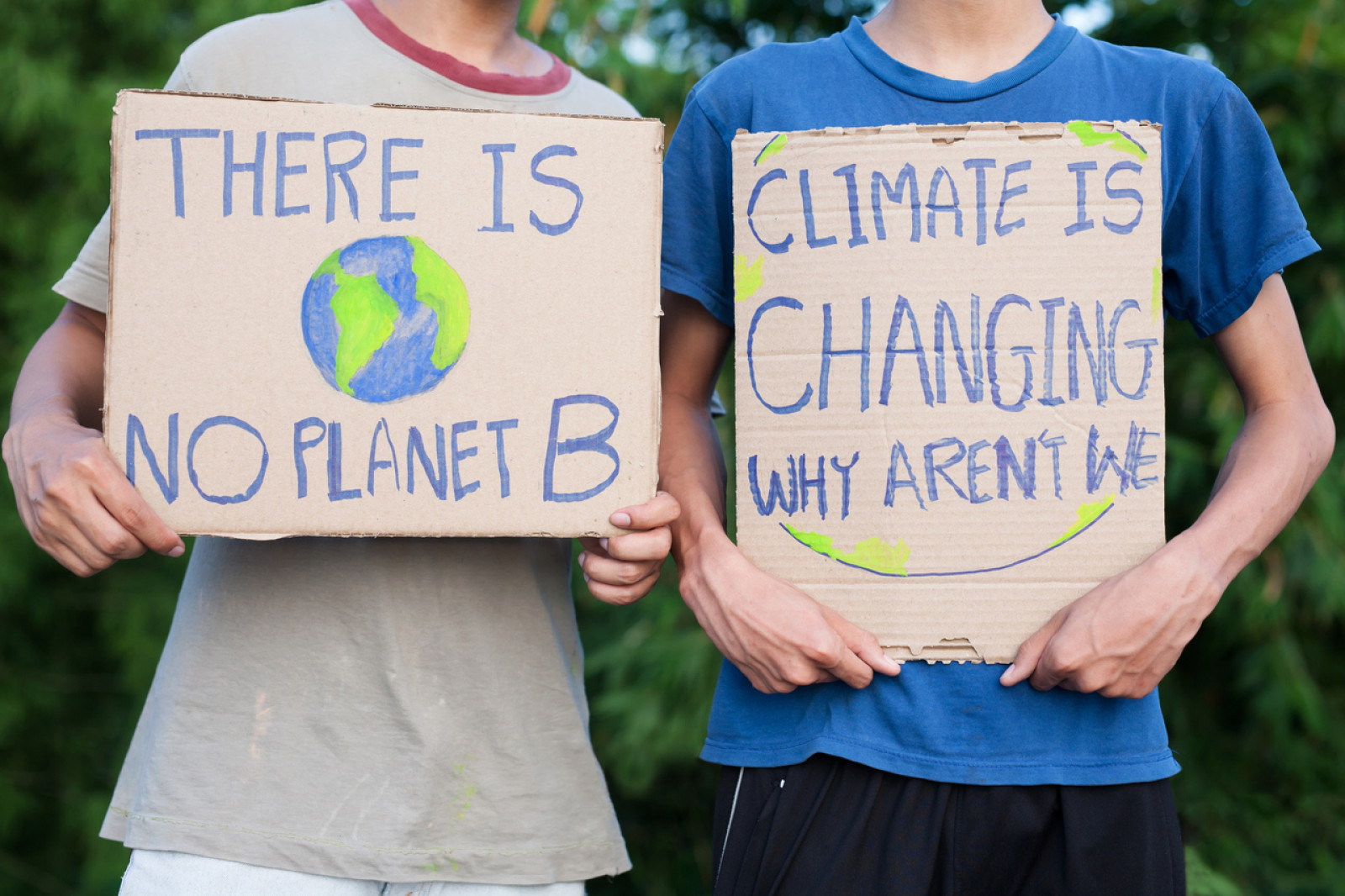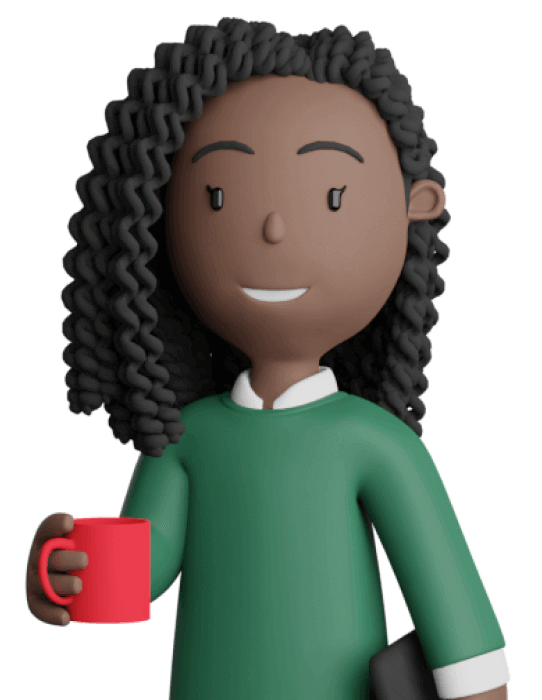Inspiring climate action posters
Create a poster inspiring others to take action for climate change.

Overview
Watch a short video clip of Swedish environmental activist Greta Thunberg, who has inspired youth around the world to think about their energy choices and take action for climate change. Your students will then design and create a poster to inspire climate action.
Instructions
What you'll need
- “Inspiring climate action” worksheet
- Poster paper, markers, paint and other art supplies
- Screen and internet connection to play video
Youth inspiring climate action
- Everyone, including young people, can take action on climate change and care for the Earth.
- Greta Thunberg has inspired people around the world to think about their energy choices and inspire others to make a difference.
- Show the video “Greta Thunberg at COP24” (0:46). Have students listen carefully for a quote, words or a message that stands out for them.
- COP24 was the United Nations Climate Change conference held in 2018.
- Greta was 15 years old in the video, explaining what motivated her and what she’d learned since starting the Fridays for the Future school strike for climate action.
- Briefly discuss the video and any messages that stood out for the students. Some messages include:
- “Our future is on the line.”
- “We need to make our voices heard.”
- “You are never too small to make a difference.”
Why should we care about energy and climate change?
- With a partner, discuss how our actions, including energy use, are related to climate change. What can we all do to make a difference? Share ideas as a class, including some of the following points:
- We use energy every day for heating, transportation, cooking and more.
- We often burn fossil fuels (coal, oil, natural gas) for energy which release greenhouse gases.
- Greenhouse gases trap more heat in Earth’s atmosphere and affect global warming and climate change.
- Using clean energy sources that don’t release greenhouse gases is important for climate action.
- In B.C., 96% of electricity is generated using water, a clean renewable energy source.
- Energy conservation, or using less energy, is one of the most important things we can do to make a difference for climate change.
- Discuss the concept of stewardship and responsibility for the environment.
- Stewards are people who care for something – in this case, caring for the Earth.
- We can all be stewards and care for the Earth through the choices we make every day.
- An Indigenous worldview includes the idea that everything is connected and that it is our responsibility to care for the land, plants, animals and environment for future generations.
Create a poster to inspire climate action
- Working with a partner or in small groups, students create a poster to encourage climate action.
- Review considerations for audience, purpose, images and messages using the “Inspiring climate action” worksheet as a class.
- Give students time to work on their posters.
- Circulate and help students generate ideas for images and messages as needed.
- Have each group present their poster.
- Allow students to provide feedback on the posters in the form of compliments, comments and questions.
- Put the posters up around the school to share the message of climate action in the school community.
Modify or extend this activity
- In 2018, when Greta was 15, she won a climate change essay competition in a local newspaper. Have students decide what aspect of climate change is most important to them and write an essay.
- Have students create a video PSA (public service announcement) to encourage people to use less energy and take climate action.
- Invite a Knowledge Keeper or Aboriginal elder to speak to the class about climate change, clean energy choices, stewardship and energy conservation.
Curriculum Fit
Grade 7 Science
Big idea
- Earth and its climate have changed over geological time
Content
- Evidence of climate change over geological time and the recent impact of humans
Curricular competencies
Applying and innovating
- Contribute to the care for self, others, community and world through personal or collaborative approaches
Communicating
- Communicate ideas, findings and solutions to problems
Grade 7 English Language Arts
Big idea
- Developing our understanding of how language works allows us to use it purposefully
Content
- Functions of text
Curricular competencies
Comprehend and connect (reading, listening, viewing)
- Recognize and appreciate how different features, forms and genres of texts reflect different purposes, audiences and messages
Create and communicate (writing, speaking, representing)
- Select and use appropriate features, forms and genres according to audience, purpose and message
Assessments
- Assess group worksheets for ability to plan and identify how to use text and images for a specific purpose and audience.
- Circulate during small group work and assess students’ ability to communicate their ideas, actively listen and collaborate with the rest of the group.
- Assess posters for ability to communicate ideas and inspire action for climate change.
Teaching Notes
Climate change
Most scientists agree that the rise in Earth’s temperature over the past 100 years is mainly caused by greenhouse gases released from the burning of fossil fuels. The greenhouse effect is a natural process, keeping the Earth warm enough for life to exist. Greenhouse gases in the atmosphere, including carbon dioxide, methane, nitrous oxide and water vapour, trap heat from the sun. The atmosphere acts like the glass in a greenhouse.
The connection between climate change and energy
We use energy in our daily lives in many ways. We use it to get to school, power our lights, cook our food and heat our homes. Energy is used to make and transport goods and materials. Some of our energy comes from the sun, wind and water. Fossil fuels are another energy source, which, like fossils, come from ancient plants and animals. Burning fossil fuels releases greenhouse gases into the atmosphere which trap in more heat and warm the Earth.
Everything is connected
The concept that everything in the environment and natural world is interconnected is foundational to the Indigenous perspectives of land and place. It is understood that we have a responsibility to care for the land, plants and animals through everything we do and the choices we make. Our energy choices impact the environment and climate change when fossil fuels are burned and release greenhouse gases. When we use less energy, we reduce our impact on the environment and help care for the Earth now and for future generations. Every little action adds up to making a big difference.
Climate change affects local Indigenous People in different ways in terms of changes to the land, plants, animals and traditional practices. Invite a Knowledge Keeper or an Indigenous Elder to speak to the class about stewardship and caring for our resources to help students understand their community and place.
Clean renewable energy sources
Choosing renewable energy sources helps reduce the impact of our energy use on the environment. In B.C., the vast majority of electricity is generated from water, a clean and renewable source. Non-renewable energy sources have a greater impact on the environment than renewable energy sources. Burning fossil fuels for energy releases greenhouse gases and carbon into the environment that had previously been trapped underground.
Energy conservation
Energy conservation means using less energy by changing behaviours and taking action. Students will come up with many ideas to save energy. Some Power Smart tips include:
- Turn off unnecessary lights.
- Use natural light. Open the blinds and turn off the lights.
- Turn off water when washing hands.
- Unplug electronics when not being used.
- Turn down the heat if you can.
- Use both sides of the paper. It takes a lot of energy and resources to make paper.






